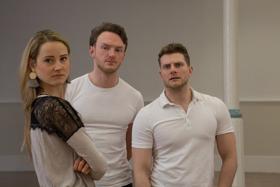Guest Blog: Director Luke Fredericks On THE COUNTRY WIFE at Southwark Playhouse

and Eddie Eyre in rehearsal
"Everything in the world is about sex except sex. Sex is about power." - Oscar Wilde
We can often neglect certain classics. Shakespeare is constantly being reimagined. Shaw, Wilde, Rattigan - they all make annual appearances at every level - be it West End, regional venues or fringe. Restoration comedy is much less featured. Partly, I guess, because the costumes alone would bankrupt a modest production, and partly also perhaps because they're seemingly frivolous and irrelevant.
Yet working on William Wycherley's The Country Wife for its forthcoming production at Southwark Playhouse has revealed much about attitudes to sex, to gender equality, to social behaviour and to class. This is from a text written in 1675, but with themes that fill our broadsheets and tabloids. The recent #MeToo campaign and the blatant misogyny and gender imbalance with regards equality are, quite rightly, at the forefront of the news.
The play is frighteningly relevant, not least because it marks a massive era of change. The Restoration of the monarchy after the staunch rigidity of Puritanism meant a huge shift towards expression, art and liberality. Women were allowed on the stage. Attitudes to sex and promiscuity were a huge draw to audiences, and the bold language and presentational performance style defined the genre.
But how could we make the heightened language laced with wit and comedy accessible? While our liberalism has increased, we cannot condone the blatant misogyny in these texts. The cuckold of the piece, Mr Pinchwife, physically threatens his wife on numerous occasions. The 'virtuous' gang of ladies are all defiled by Harry Horner and only made aware they have been duped when he, the 'dominant male', informs them.
%20%26%20Siubhan%20Harrison%20(Alithea)_%20Credit%20-%20Sarah%20Lam.jpg)
in rehearsal
We have relocated our production to the dizzying excesses of London in 1927 amidst the Bright Young Things movement.
This saw the youthful, aristocratic circles (too young to have been called up for the Great War) rebel against their elders by throwing excessive parties, immersing themselves in art and poetry and embracing a much more sexual, liberal lifestyle. A period of massive change, on parallel to the shift in the Restoration era.
I love ripping a text apart. Looking at alternative ways to play a scene, adding characters, emphasising away from the obvious and finding a new way 'in' to a world. I get bored with obvious choices to the point of distraction. If we are presenting the obvious, why go through all the stress and strain of putting the play on? Where is the relevance?
So it was with The Country Wife. Yes, in the original version the men dominate the women, but the lines are totally up for interpretation. While originally it was a male-dominated world, suddenly the female characters' wit and simplicity reveal a cunning and omnipotence that leaves the men behind.
It was reading an article about Edwina Mountbatten (1901-1960: heiress and wife of Louis Mountbatten, 1st Earl Mountbatten of Burma) that sparked a thought. She was a socialite and leading figure in the London social scene, and her promiscuity and flagrant disregard for her husband struck me as both bold and brave.
%20%26%20Daniel%20Cane%20(Sparkish)_%20Credit%20-%20Sarah%20Lam.jpg)
in rehearsal
Mountbatten's audacity and style were clearly evident. Here was an independent woman playing with power, using her femininity to both cuckold her husband and command the attention of the press and media. And this was the late 1920s.
Reading The Country Wife, it was easy to imagine a Lady Mountbatten speaking the text with her ambitious younger self in the role of Margery and her embittered older self assuming a Lady Fidget-esque disregard for her inadequate husband.
The knowingness and cunning in the text combined with a 1920s sensitivity brought a strength and knowing to these female roles I had not seen. The poise and elegance of the fashions, the hairstyles and social behaviours are all intrinsically linked to attitudes to sex and the shift in the gender balance of the era. It is this equality and the right to make an individual choice that has been our focus.
We've had a lot of fun exploring the wit of the language and the poise and elegance of the era. The words have to bubble like a newly popped Champagne bottle. The cocaine-infused era keeps the feeling high, bright and effortlessly cutting. It is a joyous combination that's been a real challenge to uncover but, when found, makes the language zing and is hysterical.
Evening out the gender imbalance has been hugely exciting. Working with a cast and challenging the obvious has been a lot of fun. Moments of shock and sexual promiscuity from both the men and women are equally shocking and hilarious. Both have desires and a desire to fulfil them.
We have not shied away from this lustful tale, more driven a tank through it to really get to grips with what makes people tick!
The Country Wife at Southwark Playhouse until 21 April
Photo credit: Sarah Lam
Comments

Videos

